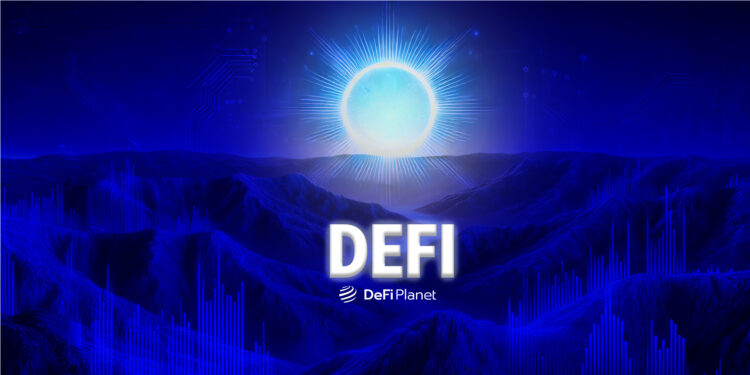Last updated on July 15th, 2025 at 06:16 pm
DeFi represents a shift from conventional financial institutions towards open, permissionless, and trustless financial services based on blockchain technology. A key benefit of DeFi is user autonomy, allowing individuals to manage their assets and engage with financial services without relying on centralized authorities like banks.
In DeFi, users retain full control over their assets, empowering them to store, transfer, and invest funds without a central authority, thereby taking charge of their financial futures. DeFi platforms are accessible to anyone with an internet connection and a compatible digital wallet, removing barriers such as credit scores or banking relationships. Operating on permissionless blockchains like Ethereum, DeFi applications require no approval from a central entity.
However, the ecosystem still largely uses centralized identity systems. This is inefficient and doesn’t fit with its vision and mission. Thus, there is an increasing need for secure, user-controlled identity verification methods that correspond with its offering. Traditional identity systems often require users to share sensitive information with centralized authorities, posing risks of privacy invasion.
The Need for Decentralized Identity Solutions
The rise of DeFi underscores the importance of improved identity solutions, specifically decentralized identity solutions. These solutions empower users to have greater control over their personal information, allowing them to share only necessary data while maintaining ownership and privacy.
Decentralized identity solutions utilize blockchain technology to establish a secure and private system. Users manage their identities through decentralized identifiers (DIDs) and verifiable credentials, which are cryptographically secure and tamper-proof.
These solutions offer several benefits including user ownership and control over data, enhanced privacy through selective disclosure and sharing of information and interoperability across different platforms and services, enabling users to maintain a single digital identity for various DeFi applications. This simplifies the user experience and encourages broader DeFi adoption.
Unlike conventional identity verifications, which come with the risk of data breaches, decentralized identity solutions enhance security and reduce the risk of identity theft. Furthermore, they align with the DeFi principles of decentralization and user empowerment.
In DeFi, secure and reliable identity verification is crucial due to the absence of intermediaries.
How Decentralized Identity Solutions are Implemented in DeFi Platforms
DeFi platforms are increasingly adopting decentralized identification solutions to streamline user onboarding. These solutions, which enable users to access financial services without the need for repeated identity verifications across different platforms, are implemented in different ways.
Self-Sovereign Identity (SSI)
Self-Sovereign Identity (SSI) is a principle underlying decentralized identity solutions, where individuals own and control their digital identities without relying on a central authority. SSI empowers users to decide how their personal information is shared and used, enhancing privacy and security.
Self-sovereign identities are easily created and managed through decentralized identity systems.
Blockchain Anchoring
Blockchain anchoring involves using blockchain technology to store and verify identity information and transactions. This ensures that identity data is tamper-proof and immutable, providing a transparent and secure way to manage identities. The decentralized nature of blockchain eliminates single points of failure, making it more resilient to attacks and breaches.
Decentralized Identifiers (DIDs) are examples of how this is done. DIDs are unique, user-controlled identifiers anchored on blockchain networks. Unlike traditional identifiers issued by centralized authorities, DIDs are created and managed by the users themselves. They are cryptographically secure and can be used across different platforms and services, allowing users to maintain control over their digital identities.
Identity-linked Smart Contracts
Identity-linked smart contracts play a crucial role in integrating decentralized identity into DeFi ecosystems. These contracts leverage verified user identities to execute transactions and grant access to specific financial services. By ensuring that financial transactions occur within the bounds of secure and authenticated identities, these smart contracts enhance trust and security within DeFi platforms.
Verifiable Credentials
Verifiable Credentials are digital statements issued by trusted entities that confirm specific attributes about a user, such as their age, education, or professional qualifications. These credentials are cryptographically signed to ensure their authenticity and can be selectively shared by users as needed, providing proof of identity without revealing more information than necessary.
Ensuring interoperability across various DeFi platforms is essential for identity implementation. Verifiable Credentials,developed by the World Wide Web Consortium (W3C), facilitate seamless cross-platform compatibility. This interoperability empowers users to efficiently use their decentralized identities across various protocols and services, resulting in a more cohesive and user-friendly DeFi experience.
Trust Frameworks
Trust Frameworks are agreements and standards that define how identities are managed, verified, and trusted within a decentralized system. These frameworks establish the rules and protocols for identity interactions, ensuring that all parties adhere to the same standards of security and trustworthiness.
Examples of Decentralized Identity Solutions
uPort in ConsenSys

uPort, developed by ConsenSys, is a decentralized identity platform that empowers users with self-sovereign identities. It allows individuals to securely manage personal information on the blockchain, ensuring autonomy and security with seamless access to DeFi services.
uPort has a system in place to help verify user identities while safeguarding privacy.thus DeFi platforms can leverage the tool and still be compliant with KYC (Know Your Customer) and AML (Anti-Money Laundering) regulations.
Sovrin Network

Sovrin helps erves both both individuals and organizations gain autonomy over their digital identities. The platform provides verifiable credentials that DeFi platforms utilize for identity verification and reputation management within decentralized finance. Consumer also have the capability to selectively disclose information to DeFi services.
Bloom Protocol

Bloom Protocol, powered by Ethereum & IPFS is a blockchain-based protocol specializing in identity verification, risk assessment, and credit scoring solutions. Within DeFi, Bloom facilitates decentralized credit scoring, allowing lenders to utilize its system for evaluating borrower creditworthiness with transparency and reliability.
Bloom’s platform ensures secure and private onboarding of users to DeFi services through robust identity verification processes. DeFi platforms integrate Bloom’s tools for credit risk assessment, enhancing risk management strategies and lending practices within the ecosystem.
Civic

Civic offers blockchain-based identity verification technology that gives users control over their digital identities and personal data. Civic provides secure user authentication solutions, enabling secure identity verification for accessing DeFi platforms and minimizing risks related to identity theft and fraud.
Users can verify their identities for KYC purposes without compromising privacy and maintaining confidentiality in financial transactions. Trusted by Polygon, GITCOIN, and MetaPlex, Civic’s verified credentials enable users to establish and manage reputations within the DeFi ecosystem, promoting trust and credibility in their interactions.
Challenges and Barriers to Adoption of Decentralized Identity in DeFi
While decentralized identity solutions represent a dynamic aspect of the DeFi world, they face several challenges:
Regulatory Compliance
Implementing identification systems in DeFi introduces regulatory compliance challenges. While these systems enhance security and privacy, they must align with evolving legal standards. DeFi platforms need to navigate regulatory landscapes to ensure decentralized identities meet compliance requirements. Collaboration between industry stakeholders and regulatory bodies is crucial for establishing clear guidelines and frameworks.
Adoption and User Education
Successful implementation of decentralized identity in DeFi requires widespread adoption and user education. Platforms must educate users about the benefits and functionalities of identity solutions to foster trust and acceptance. Clear communication about how these systems enhance security and privacy is essential. User-friendly interfaces that simplify the adoption process and provide intuitive experiences will play a pivotal role in encouraging widespread adoption.
Interoperability Challenges
Achieving interoperability across diverse DeFi platforms and decentralized identification solutions poses significant challenges. Seamless integration and cross-platform compatibility depend on standardized protocols and frameworks. Initiatives by organizations like the Decentralized Identity Foundation (DIF) and the World Wide Web Consortium (W3C) aim to establish interoperability standards such as Verifiable Credentials. These efforts are crucial for creating a unified environment where users can easily utilize their identities across various DeFi services.
Potential Future Developments in Decentralized Identity
As DeFi continues to evolve, several emerging trends and technologies are shaping the future of decentralized identity:
Decentralized Identity as a Standard
The future of DeFi is poised to integrate decentralized identification as a standard feature across all platforms. This advancement will eliminate the need for redundant verifications, allowing users to maintain a single identity for seamless interaction with various financial services. This streamlined approach, centred on user convenience and security, is expected to catalyze widespread adoption of DeFi.
Privacy-Preserving Innovations
Future developments in decentralized identity will prioritize privacy enhancements through innovative technologies. Techniques such as homomorphic encryption and zero-knowledge proofs will bolster the security of user data, ensuring that interactions within DeFi are conducted with utmost confidence in the protection of personal information. These advancements will empower users to engage more freely while safeguarding their privacy.
Global Accessibility and Inclusion
Decentralized identity solutions are set to enhance global financial inclusion and accessibility. By enabling individuals to prove their identity without traditional documentation, these solutions broaden access to financial opportunities worldwide. DeFi, fueled by decentralized identity, is poised to become a catalyst for global financial inclusion, empowering individuals irrespective of their geographic location or access to conventional identification documents.
Final Thoughts
Looking ahead, decentralized identity is poised not only to be a feature but a critical component of DeFi, facilitated by collaborative efforts across the industry, regulatory bodies, and consumers.
Embracing decentralized identifiers allows DeFi developers to build a safer, more user-friendly, and innovative financial ecosystem, benefiting the blockchain community and driving the adoption of DeFi and other blockchain applications.
Disclaimer: This article is intended solely for informational purposes and should not be considered trading or investment advice. Nothing herein should be construed as financial, legal, or tax advice. Trading or investing in cryptocurrencies carries a considerable risk of financial loss. Always conduct due diligence.
If you would like to read more articles (news reports, market analyses) like this, visit DeFi Planet and follow us on Twitter, LinkedIn, Facebook, Instagram, and CoinMarketCap Community.
“Take control of your crypto portfolio with MARKETS PRO, DeFi Planet’s suite of analytics tools.”





















